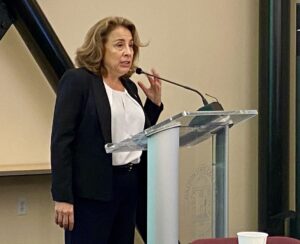
Update: SR 85 was put on the Senate Consent Calendar for Study Committees which was approved on March 27, 2023. Vote record here (Senate vote 295).
The 2021 House version of this effort did not allow public comment and handpicked all advocate “witnesses.”
From experience, we predict a star and regular “expert witness” will be media darling, illegal alien and FWD.us lobbyist Jaime Rangel.

Did you know that Georgia apparently “has some of the country’s more burdensome occupational licensing laws and that onerous occupational licensing requirements can inhibit economic mobility, limit job prospects, and hinder small businesses?”
That is the opinion of the sponsors of SR 85 under the Gold Dome. They are all Republicans.
- See the list of sponsors.
At the “request” of the Georgia Chamber of Commerce, these GOP state senators want to create a ‘Senate Occupational Licensing Study Committee’ to decide how to “reform”occupational licensing and “streamline processes, reduce barriers to work, and eliminate unnecessary rules and regulations.” They plan on a series of meetings to hear from the special interest community on how this can be done and maybe how other states have handled “reforming” this “onerous” system.
What, you may ask is the “onerous and burdensome” part of the Georgia occupational licensing system? In large part it refers to the fact that Georgia has laws in place that require verification of lawful presence for occupational and professional licensing. Shorter: Dismantle the laws – periodically obeyed and enforced – that are aimed at keeping black market labor out of Georgia’s workforce.
This writer has been working on the verification law, OCGA 50-36-1 since 2006.
I know because I followed this same dog and pony show study committee process when the House produced it in 2021. Then it was part of a study committee dedicated to “Innovative Ways to Maximize Global Talent.” It is the work of the partnership between the Georgia Chamber of Commerce et al and a leftist group known as the Coalition of Refugee Services. That partnership is known as Business and Immigration for Georgia or “BIG.”
- Related: The Georgia Chamber of Commerce and “Diversity, Equity and Inclusion.”

A “Progressive” woman named Darlene C. Lynch works for both CRSA and the “BIG Partnership” and organized and ran the 2021 Georgia House Special Committee “Innovative ways to Maximize Global Talent” that saw three 2021 Summer and Fall meetings – with two in Georgia’s public colleges. Back then the study committee produced the impetus for a bill (HB 932) that would have eliminated the current twelve month residency period before a (public) college -bound student could qualify for instate tuition. The bill only applied to foreigners migrating into Georgia. Americans moving here from other states were not covered under that measure. They would still pay the much higher tuition rate in their first year living here. About three times as much as a student who migrated here from Afghanistan, for example.
For clarity: The goal was and is for some foreigners (example) to be able to migrate into Georgia and qualify for instate tuition the same day while Americans moving here are required to be residents for a year before that could access the same tuition rate.
- Related: For academic year 2020-2021, the average tuition & fees for Colleges in Georgia was $4,739 for in-state and $17,008 for out-of-state. Americans who relocate here would pay the higher amount in their first year of residence. Newly arrived foreigners would pay the lower amount. That is a difference of $1226.90.
That same effort is back in today’s General Assembly in both the Senate and House.
That 2021 special study committee was created by a resolution that passed unanimously in the House at the end of the 2021 session. Rep Wes Cantrell was the sponsor of the resolution (be sure to see all cosponsors) and served as the chairman of the agenda-driven committee that took zero pubic comment and arranged the witnesses.
Some of the agenda items from the hand-picked, pre-screened witnesses at the 2021 special committee mentioned above:
- Changing state law so as to allow foreigners to be law enforcement officers in Georgia
- Reciprocal agreements on occupational licensing rules with other states and foreign nations – put a different way, other states and nations would decide who was eligible to be receive occupational and professional licenses in Georgia.
- “Relaxing” state law that requires immigration verification of applicants for occupational and professional licensing.
- Lower tuition rates in public colleges for illegal aliens living in Georgia with DACA status than the rate Americans and legal immigrants from other states pay.
- Removing the existing 12 month residency waiting period before new Georgia residents can access instate tuition in public colleges for refugees – but not for Americans moving here from other states.
- Reducing the educational period to become a medical doctor by two years, student loan forgiveness for foreign medical students and “relaxing the immigration issues for foreign medical graduates.”
- Creating a new state bureaucracy to accommodate “an office or a division of cultural and linguistic responsiveness.”
I lost track of the number of times “…the number one state for business” was tossed out.
I covered the meetings extensively for the subscription news outlet Insider Advantage Ga and also posted those reports here.

